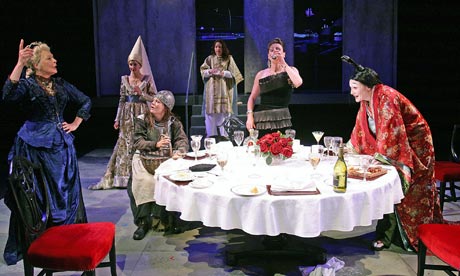We were told in class that this play was a very significant play in terms of feminism in British Theatre history. Caryl Churchill was the first feminist playwright of her time and Top Girls was one of her hits. So, naturally, after all this talk about the play I had some high expectations for Top Girls. Unfortunately it came up very short.
Let me start with the very first scene. Dr. Q had told us that the first scene was very different from the rest of the play but I was thrown off and turned off, by this scene. The portrayal of all the women in the scene were that they were there to talk about matters of their own lives rather than talking to each other and understanding each other. I understand that as a feminist it is crucial to show women in power, but Churchill included the way they fell out of power and the emotional weaknesses attached to the downfalls. This portrayal only adds to the view of women being the weaker gender and makes the audience either pity the characters or get annoyed by their actions. How is this supposed to make the play a groundbreaking feminist play? Obviously each woman has some sort of feminist bone in herself. We want woman to prevail based on what she has to offer to the world, not based on her gender or her race or what she looks like. However, the success stories of each of the women at the table in the first scene fall face first because they are discovered to be women and that is what leads to their downfall.
Another aspect of the play that confused me was why the women would talk over each other. It was difficult to follow conversations because women would cut in and cut out of the dialogue. I could tell that the other audience members were confused about what was going on as well. It was clear that both women had an opinion and wanted it to be shared; to understand each opinion and to react to it took a certain level of understanding in which the script had not allowed. It would have been easier to connect and relate to each character had we, the audience, been able to understand what they were trying to say.
The last thing that may have affected my view of the play was the fact that we read the entire last scene in class. During the play, since we had read over the act in class, I could almost say the same lines that the characters had been saying. Granted, I did not have any knowledge of what the previous acts had been but after watching the first two there was not much of a correlation. At this point of the play I really wanted to leave because I knew how it ended.
It wasn’t the performance of the actors that was disappointing; it was the script itself that let me down. I was excited to see a play that would bring out my feminist feelings; instead, this play just made me want to leave and get my money back for the time wasted. Caryl Churchill, you may have been a revolutionary in your time, but in my time you were just a disappointment. I will forever remember this play as a play that just wasn’t enough.




No comments:
Post a Comment